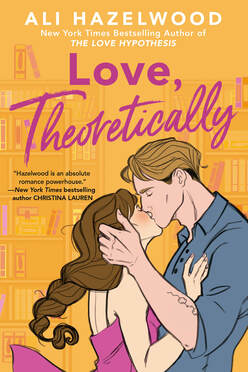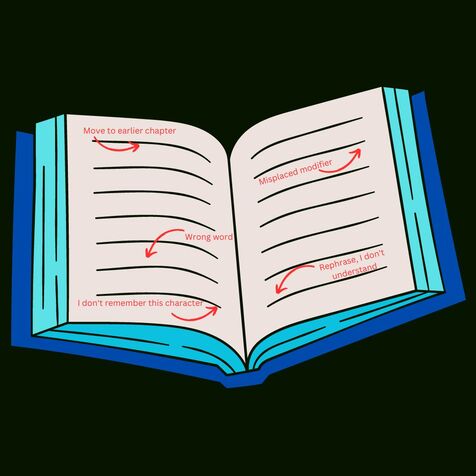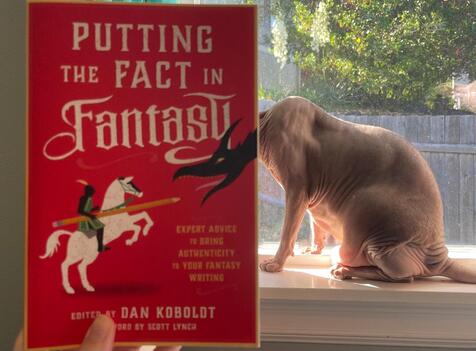|
The cover of Love, Theoretically Love, Theoretically by Ali Hazelwood is a STEM romcom, which is Hazelwood's signature subgenre. It's been heavily advertised to me because I read two of her other books (The Love Hypothesis and Love on the Brain.) Her other book is a trio of novellas collectively titled Loathe to Love You and she has a YA coming out later this year called Check & Mate.
Love, Theoretically focuses on recent PhD grad Elsie's hunt for a job in academia as a theoretical physics professor. She has three adjunct positions and no health insurance, and with her glitchy insulin pod, time is of the essence to find stability. Let's not forget her side hustle as a girlfriend-for-hire (not for sex.) She's invited to interview at MIT but upon arrival learns the tricky politics involved in filling the position. One of the interviewers is Jack, an infamous theoretical physics critic who Elsie has hated for about a decade. Will they be able to get over their rivalry in order to get together or at least get Elsie the job? Find out. I enjoyed the way Hazelwood calls out the bullshit in academia (as she does in every book) this time focusing on the way department politics can cost applicants time and money, the horrible adjunct system (why yes, I was also an adjunct and no, I didn't get health insurance either), and the way that PhD advisors have way too much power over their students' lives. I liked Elsie's growth as a character--in fact, if you're a writer struggling with writing character arcs, Elsie is a super easy study because you can see her flaw from miles away and it's easy to keep an eye on how that flaw changes with the story beats. Alas, I didn't enjoy the book as much as I wanted to. I think Jack was too much like Adam and Levi (the male leads from the other two novels by Hazelwood) and he felt very flat. The dynamic of the couple was also too similar--giant quiet man, farther in his career and considered more successful than the female MC, is accused of hating the female MC so she hates him and is also small and quirky. After the second or third chapter I correctly predicted every "twist" in the book because it was so similar to the others. This book is for you if you loved The Love Hypothesis/Love on the Brain/Loathe to Love You and want more of the same, if you want an MC who is in physics or has diabetes, or if you want an academic-HEA (happily ever after) for an adjunct. It's not for you if you don't enjoy enemies/rivals-to-lovers, if you didn't enjoy Hazelwood's other books or want something new, or if you are not in the mental space to read about someone's academic job hunt. Have you read Love, Theoretically or any of Ali Hazelwood's other books? What do you think? Which STEM career do you hope her next MC has? Let's discuss in the comments!
0 Comments
If you're friends with any writers, there may come a time when you're asked to beta read their book. Maybe you're a writer yourself, maybe not, but either way beta reading is different from reading a typical book. If you've never beta read before and don't know how, this post is for you! Here are five steps for how to beta read.
Step 1: Upfront Questions Before you agree to beta read, ask the writer some key questions. Your goal is to determine if you're the right audience for this book. Ask for: genre, age group, word count, brief pitch.
Step 2: Set Expectations After you agree to beta read, ask the writer what their expectations are.
Step 3: The Read Now you're ready to read.
Step 4: Summary After your finish reading, you may have some overall thoughts to put together in a summary.
Step 5: Letting Go
Ready to go beta read? Have more advice for beta readers out there? Let's discuss in the comments! Clue as a dragon. Photo by Kate Ota 2023 Putting the Fact in Fantasy is a collection of essays by subject matter experts about various topics that are often portrayed poorly in fantasy books, movies, and TV. The collection was edited by Dan Koboldt. I came across this book in an Indie bookstore and thought it would probably be helpful for my adult fantasy WIP.
Overview The fifty essays cover topics such as history as inspiration (female professions in medieval Europe, feudal nobility), languages and culture (realistic translation, developing a culture), worldbuilding (magic academies, money, political systems), weapons (archery, soldiers, martial arts), horses (so many horses), and adventure (hiking, castles and ruins). Pretty large variety! Most entries are less than ten pages, and the entire book is only 332 in paperback. My Experience There is a large skew toward European information, but some sections specifically call out non-Western information, like the feudal nobility section which included Middle Eastern titles. Very few sections are focused solely on non-Western information. Most of the historical info is also medieval or even Renaissance, with very little historical focus on more recent time periods. Some essays in the worldbuilding section are less about time period and more about making you think more deeply about your world, which was very helpful. I marked many sections I want to return to, including one about plants. I will say, the horse section went on a bit too long. Is It Worth It? I paid $20 at an indie bookstore for a paperback copy. The ebook is slightly cheaper ($14.99) but if you want to highlight or bookmark sections that you want to think about later, a physical copy is a good investment. This book could be worth it if you're writing a historical fantasy or secondary world fantasy. If you're writing urban fantasy, magical realism, or contemporary fantasy, this book will not be as valuable to you. (Unless you're writing about horses and know nothing about horses.) This book may also be useful for other writers who are writing secondary worlds, since the worldbuilding section is pretty flexible. Bonus, there's also a section about Westerns! Overall, it was worth the price to me. Have you read Putting the Fact in Fantasy? What about the other anthology edited by Dan Koboldt, Putting the Science in Fiction? Let's discuss in the comments! |
Archives
April 2024
Categories
All
|




 RSS Feed
RSS Feed